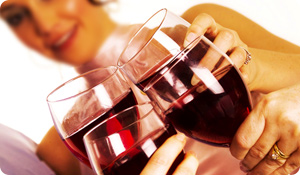
Is it time to hoist a toast to the pleasures of drinking? If you're diabetic and you don't already imbibe, you won't find any medical authority recommending that you start consuming alcohol. However, it appears that people who consume alcohol in moderation have a lower incidence of diabetes, reports Meena Murthy, MD, FACE, of Saint Peter's University Hospital in New Brunswick, NJ. And diabetics who drink in moderation can decrease the likelihood of certain adverse health conditions.
That doesn't mean twenty somethings should start stocking an at-home wine cellar. The main beneficiaries of moderate alcohol consumption are middle-aged and older people.
"But there is no evidence that we should be recommending that people start drinking if they don't already," she cautions.
Light to moderate alcohol consumption is associated with a decreased risk not just of type 2 diabetes, but of heart and blood vessel disease, explains Hope Warshaw, MMSc, RD, CDE, BC-ADM. This may because alcohol helps increase the HDL (good) cholesterol, she explains. "Drinking also increases insulin sensitivity," Warshaw says. "And this helps to lower blood pressure."
Since diabetics often suffer from heart and blood vessel diseases, the benefits associated with drinking alcohol are very good news. And when alcohol is consumed with a meal, it does not have a quick effect on blood sugar or insulin levels, Warshaw says.
Drinking does have a downside, though. Besides slowing down physical and mental reaction times and impairing judgment, it can actually cause the blood sugar to dip too low or rise too high. This depends on how much you drink at one time, and whether or not you eat while drinking, according to Warshaw.
To get the benefits of alcohol consumption, it's crucial to limit how much you drink, explains Michelle Bravo, RD, LDN, CDE, director of diabetes education at The Diabetes Center at Mercy Hospital in Baltimore, Maryland.
Alcohol appears to be beneficial when women restrict consumption to 1 drink per day and men restrict theirs to 2 drinks per day, Bravo says. A drink translates into 4 ounces of wine, 12 ounces of beer, or 1 ½ ounces of 80-proof distilled spirits such as whiskey or gin. "When kept to these limits, there was not an adverse effect on blood pressure," Bravo says.
And individuals with certain health conditions should avoid drinking alcohol altogether, Bravo says. This includes people with very high blood cholesterol and high triglycerides, she says.
If you choose to drink alcohol, drink safely. Warshaw recommends the following:
-
Don't drink if your blood sugar is on the way down or is already low. Eat something to raise it before you pour a drink.
-
Check your blood sugar more often while drinking, which will help you prevent lows.
-
Be prepared to treat a low blood sugar while you're out and about. If you're going out for the night, take along boxes of raisins, juice boxes or hard candy such as Lifesavers.
-
Don't go to sleep for the night after drinking without testing your blood sugar. If you are low or you think you will be in a few hours, have a snack.
-
Be sure to wear medical ID–either a bracelet or necklace. The symptoms of intoxication and hypoglycemia are very similar.





